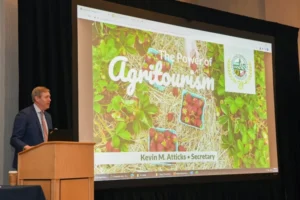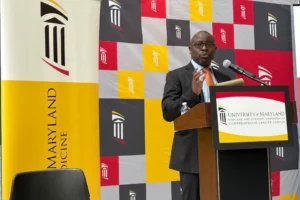CHIB Research Part of New USDA Center of Excellence Dedicated to Sustainable Water Reuse
Fri Mar 25, 2016
Research initially funded by the Center for Health-related Informatics and Bioimaging, (CHIB) plays a key role in a just-announced(link is external)multidisciplinary effort to develop innovative, safe and sustainable ways to irrigate food crops in variable climates.
The “CONSERVE” Center of Excellence, established with a $10 million, four-year award from the USDA National Institute of Food and Agriculture, will be led by Amy Sapkota from the University of Maryland’s School of Public Health(link is external).
The goal of the new center—which unites Sapkota, Mihai Pop andRita Colwell with researchers from across the Mid-Atlantic and the Midwest—is to identify nontraditional water sources and new water treatment technologies that farmers can safely use on food crops, without compromising public health.
“We’re running out of water in our key food production regions,” says Sapkota, an environmental microbiologist. “We need to act now to figure out how to shift water usage patterns and successfully reuse water to sustainably and safely grow our food.”
Three years of seed funding from CHIB supported a series of pilot studies that examined topics like the possible use of treated wastewater as a source of crop irrigation.
Data from these early studies—gathered by Sapkota, Pop and Emmanuel Mongodin(link is external) from the Institute for Genome Sciences in Baltimore(link is external)—played a key role in the successful proposal for the USDA Center of Excellence, the researchers say. “It’s a great example of how we turned the pilot data generated from CHIB funds into something really big,” Sapkota adds.
“We were able to bring together our expertise in computational genomics, wastewater microbiome analysis and antibiotic resistance to identify the primary challenges and possible avenues of discovery that were ultimately funded by the USDA,” says Pop, an associate professor of computer science who also has an appointment in the Center for Bioinformatics and Computational Biology(link is external) (CBCB).
Pop is leading the CONSERVE center’s data analysis core aspect. He will be responsible for helping different sub-projects share and analyze data, as well as for disseminating the project’s scientific results to the public.
CONSERVE also includes expertise from bioscientists, engineers, economists, social-behavioral scientists, law and policy experts, agricultural extension specialists, educational media developers, computer scientists and public health specialists.
Colwell, a Distinguished University Professor of cell biology and molecular genetics who is also in CBCB, will provide bioinformatics analysis by employing GENIUS, a powerful software system developed to identify bacteria, viruses, fungi and parasites in wastewater before, during and after treatment.
The software—developed by a startup Colwell founded, CosmosID(link is external), will be an important tool for analyzing water quality and both human and animal health.
CHIB was launched in 2012 as part of the University of Maryland: MPowering the State initiative(link is external), which brings together faculty and students from the University of Maryland, College Park, and the University of Maryland, Baltimore, to focus their collective expertise on critical statewide issues of public health, biomedical informatics and bioengineering.



